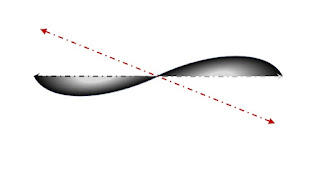Many of us have at one time or another drank too much in a given evening. This was certainly a mistake at least as judged by how the body and brain spent many hours the next morning screaming about it. Over drinking is an easy mistake to make especially when you are having a great time in unusual circumstances. One too many sneaks up on you.
This type of mistake can have very serious including deadly consequences of course. It is all the worse since it compounds on itself through the natural impairment to judgement and accentuation of confidence. Fortunately in most cases this will only result in a painful hangover.
Contrast this one-night stand of bad decision-making with alcoholism. A serial drinking problem is not so much a mistake as it is a trap. From what I understand there are about six percent of adults who suffer with what is labeled an alcohol problem. Some of these are people who are making a series of mistakes, which is in itself a form of trap. For others, perhaps a majority, the trap is the effect alcohol itself has in capturing them.
I don't want to get into the weeds on how much agency those with an alcohol problem have or what the expectations of them should be. It seems in either case, low or high agency/responsibility, there is a trap condition being met. They are in a whirlpool from which escape is proving difficult. This is the nature of a trap as I am conceiving it.
A mistake is just like it sounds. We are confronted daily with chances to make mistakes of many kinds with many varying potential magnitudes. In almost all cases the chances are extremely low to low--otherwise the world would be chaos. And correspondingly the implications are small. Yet life has fat tails and the realm of mistakes is no exception.
One way to make mistakes worse is by following them up with mistakes--especially in the commission of a mistake cover-up. All the more reason to remember not to talk to the police. In this way a mistake upon a mistake can create a trap. Of the many great fiction depictions of this phenomenon, The Wire is perhaps the best showing time and again a wide variety of characters falling into traps because of mistakes made.
It can be hard but is important to distinguish mistakes leading to trap conditions and trap conditions alone ensnarling people in their grasp. Again, The Wire has examples of both. A kid in an inner-city public government school is a kid deep within a trap-rich environment. That same kid can be on a good course set for likely escape but for the kid-being-a-kid moment with the wrong teacher landing him in his first-time detention, getting connected to kids already within the trap, finding himself labeled by the bureaucracy, pushed and pulled into the trap.
For traps we need paths to escape. Yet we must keep in mind two important truths: (1) We cannot change those who would not change themselves and (2) We should balance the tradeoff between help and enablement.
In the first truth we fight against the cynics but also must come to grips with how in vain our efforts will be without willingness on the part of the would-be beneficiary. "You can't help them; don't bother," is too easy and too callous an excuse we use to not care and not try. However, resources are scarce. We can cannot afford to give effort to lost causes.
In the second truth we fight against the trap of simply treating symptoms* and insulating the trapped from the cost of their decisions when we are trying to render actually helpful aid and a true way out. To take one example, UBI's biggest shortcoming isn't its ridiculous math. It is the risk that becomes a lifestyle enabler rather than an enabler of life improvement. The adage "don't cry over spilt milk" needs a corollary: "quit doing whatever you're doing that is spilling the milk".
For mistakes the framework needs to be quite different. Here we need a high tolerance for mistakes (the U.S. bankruptcy code is a great example) as well as robustness against their magnitude. Arnold Kling's conceptual tradeoff of hard-to-break versus easy-to-fix seems quite important here. We should seek more of both as they are not always mutually exclusive. When they are in opposition, we need to realize and prevent increasing one if it comes at too high a cost decreasing the other.
Don't avoid mistakes--they are the lifeblood of success and progress. Forgive others and yourself for mistakes while working to not needlessly repeat them.
Don't be blind to traps--they are everywhere attempting to seduce us. When you're in one, admit it. Work hard to get out knowing that the solution is probably somewhat counterintuitive.
*look for a future Bandages versus Inoculation DA








